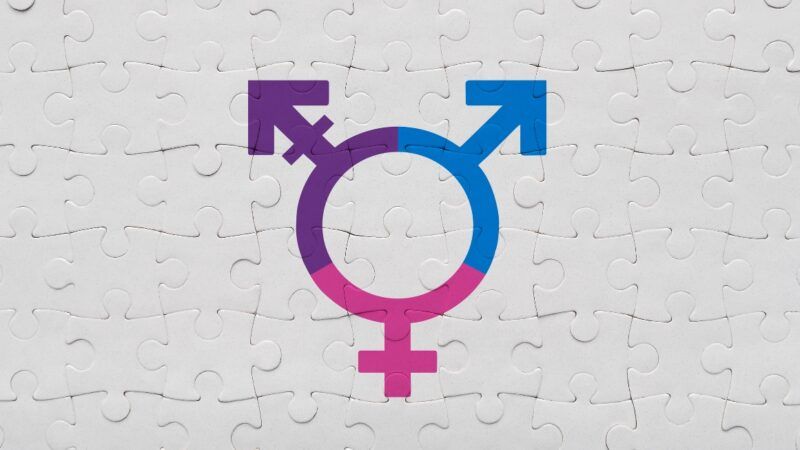Missouri Lawmakers Suggest Infantilizing Trans Adults and Depriving Them of Treatment Until Age 25
Another proposed ban shows the true motivations of the culture war.

Missouri is considering legislation to ban trans medical treatments for minors, and lawmakers and one psychologist who testified at a hearing last week suggested forcing even legal adults to wait until they're 25 years old.
The Hill took note of that suggestion from a Thursday hearing for H.B. 2649, but to be clear, the bill as it stands would not prohibit trans adults from getting any form of medical treatment or therapy. Much like similar bills passed in Alabama and Arkansas, it prohibits any sort of "gender transition procedures" being offered to anybody under the age of 18, with exceptions for those with verified genetic disorders and an exception for treatment for "any infection, injury, disease, or disorder that has been caused by or exacerbated by the performance of gender transition procedures."
Nowhere in the bill does it consider the rights of parents, the expertise of medical professionals, or the desires of the minors, in any way. Like other bills of this type, H.B. 2649 is culture war fodder that dismisses individual liberty out of fear of trans ideological contagion. The bill is named the "Missouri Save Adolescents from Experimentation (SAFE) Act," not so subtly suggesting what the bill's sponsor, Rep. Suzie Pollock (R–Lebanon), thinks of trans medical treatment.
In case it's not clear, Pollock has also introduced a companion bill that would change the state's medical malpractice laws to allow extra time for a lawsuit for treatments for gender dysphoria. Missouri law gives a two-year window for medical malpractice suits, but Pollock's bill would allow a person who received trans medical treatments until the age of 28 to sue. It would also mandate that before anybody (even a consenting adult) can get medical trans treatment, they must be provided with the latest research on detransitioners (those who return to their birth sex), data on "satisfaction rates" of various types of gender treatments, and information on potential therapeutic, nonmedical approaches.
In case it's still not clear, here's a direct quote from Pollock from Thursday's hearing: "These drugs can sterilize children and never allow them to experience an orgasm. Do you want to do that to a child, do you want to strip them of that? If they go all the way through it, they are never content. [emphasis added] People who are fully trans, they don't have normal sexual function." This isn't about ascertaining whether a child is truly trans before providing him or her access to medical transition treatment. This is a complete rejection of the validity of using medical treatment to resolve trans issues.
It is very tempting to see bills like this as a response to the very real concerns that teens and kids who are questioning their gender identities are being pushed by adults with their own agendas into rushing into medical treatments with long-term or irreversible effects. But this bill isn't an expression of concern; it's an application of political power over a small group of people. It is a war between two polarizing agendas with trans kids and their families trapped in the middle and with strangers on both sides screaming that kids' lives are at stake if they make the wrong choice—and the wrong choice is, of course, whatever the other side is proposing.
The suggestion from conservative quarters that adults should perhaps have to wait until 25 for medical treatment is just a skewed version of progressive attempts to infantilize young adults by raising the smoking age to 21 or stopping them from buying guns until they are 21. It makes a mockery of the idea of self-ownership. And it undermines claims that this anti-trans legislation is about protecting impressionable kids from rashly disrupting puberty.
If there's any doubt these bills are about dismissing trans medicine entirely, take a look at who was brought in for the hearing: a psychologist named Laurie Haynes. St. Louis' NBC affiliate KSDK describes her simply as a board member of the neutral-sounding International Federation for Therapeutic and Counseling Choice (IFTCC). The story notes that at one point Haynes does mention during the hearing that she supports conversion therapy, the practice of attempting to "cure" somebody of homosexual or trans feelings.
To be clear, conversion therapy is the entirety of what the IFTCC stands for. This vaguely-named U.K.-based organization's primary goal is to lobby in favor of conversion therapy not just for trans folks but also for gay and lesbian people. This is not a neutral organization operating out of concern for youths who incorrectly or rashly conclude they're trans and start medical treatment early. This is a group that believes that even those who are gay or trans can be "cured" of these urges and exists to lobby against legal bans against conversion therapy.
Mind you, legal bans against conversion therapy are themselves bad because they suppress free speech and the exchange of ideas—even those considered disreputable or junk science. Those who consent to it have every right to consult somebody to try to "cure" them of their homosexuality or gender dysphoria, regardless of whether it's actually effective (which it is not).
This element of the culture war is, ultimately, the consequence of putting lawmakers in charge of deciding what sort of treatment for trans and gay people is "legitimate." Lawmakers don't have the ability to determine which trans treatments are actually "legitimate;" they only have the power to decide which treatments are legal. And that's not the same thing.
It's particularly telling that the IFTCC has a declaration on its site that it's an infringement on human rights and freedoms to ban conversion therapy while at the same time a member of its board is advocating for a legal ban on a different sort of medical therapy for the same concerns. That's not what support for freedom looks like.


Show Comments (176)